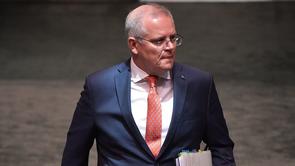 Australian Prime Minister Scott Morrison during Question Time in the House of Representatives at Parliament House on Dec 09, 2020 in Canberra, Australia. (PHOTO / BLOOMBERG)
Australian Prime Minister Scott Morrison during Question Time in the House of Representatives at Parliament House on Dec 09, 2020 in Canberra, Australia. (PHOTO / BLOOMBERG)
CANBERRA - Australian Prime Minister Scott Morrison is facing a revolt from within his government over a net-zero emissions target.
Morrison said earlier in February that it was his "preference" for Australia to achieve net-zero emissions by 2050 amid pressure from fellow world leaders to embrace the target.
However, the Nationals Party, which forms the governing Coalition with Morrison's Liberal Party, has hit back at the move.
The Nationals Party, a member of the governing coalition, has hit back at the target of achieving net-zero emissions by 2050
Matthew Canavan, a Nationals senator and former minister, said the climate debate was a distraction and the 2050 goal was a "mythical target."
He joined Former Deputy PM Barnaby Joyce in threatening to cross the floor and vote against net-zero emissions legislation if Morrison brought it to the Parliament.
ALSO READ: Australia excluded from global climate talks as policies lag
"I am opposed to it," Canavan, an advocate for coal-fired power generation, told the Australian Broadcasting Corporation (ABC).
His comments came days after Michael McCormack, the leader of the Nationals, said agriculture could be exempt from emissions targets.
In response, the National Farmers' Federation (NFF) said that it supported reaching net-zero by 2050 and that agriculture was "too important" to leave out.
"The NFF's climate policy is clear: farming and agriculture cannot be worse off going forward with any carbon commitments or emissions reduction schemes," NFF Chief Executive Tony Mahar said in a recent statement.
READ MORE: Australian PM defies pressure to adopt emissions target
"Farmers are in the box seat to seize the opportunities from a reduced emissions future, and many are already doing just that. Any policy that restricts opportunities available to farmers and rural and regional communities would clearly be a negative outcome."


